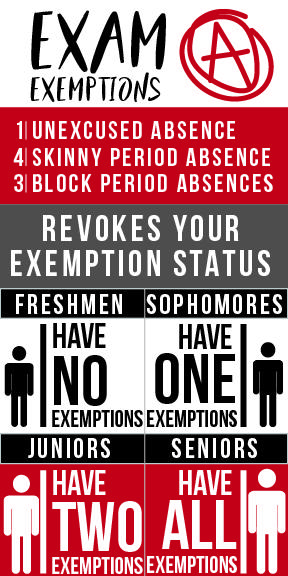Exemption policy changes affect majority of student body

This year for the 2017-2018 school year at Coppell High School, freshmen, sophomores and juniors are required to take all or a few of their semester exams. Seniors qualify for exemptions for both the spring and fall semesters.
September 1, 2017
The 2017-2018 school year at Coppell High School has already proved to be a year of change with, most notably, a lanyard policy, a new principal and block schedules. Among these changes is a new exemption policy that will affect the majority of the student body.
This year, freshmen are required to take all their exams for both the fall and spring semesters and sophomores and juniors will only be eligible for spring exemptions. Seniors retained their privilege for being exempt from both semesters of exams.
Sophomores qualify for one exemption during the spring and juniors are only eligible for two exemptions in the spring. Both grades will take all their exams in the fall.
“From an education standpoint, one of the problems we see as teachers is that students want to box in each unit and when they take a test over unit three, they just study for unit three and once the unit three test is over, they forget everything about unit three,” IB/Pre-AP Chemistry teacher Susan Sheppard said. “Having that end of course exam, helps keep you focused and not mentally shoving everything aside about that test.”
Sophomores, juniors and seniors will qualify for exemptions only if they have two or less excused absences in their block classes or three in their 55-minute “skinny period” classes. If a student has even one unexcused absence or more than four tardies, they are ineligible for any exemptions this year.
“I understand, maybe, why they did it because so many people were being exempt,” senior Emily Evans said. “I don’t know if [a cumulative test] is necessarily beneficial but, the school doesn’t like a bunch of people being absent, the administration would likely prefer people to be at school.”
The administration has been talking about making a change to the exemption policy for a long time and part of the reason includes instilling more college-readiness in students.
“The biggest piece for us, and I’m speaking for myself more than the district, is that we want to make sure that when our students leave this campus and go off to college, they have had the experience of going through that practice,” associate principal Sean Bagley said.
According to the student handbook, in order to qualify for an exemption, students must have a semester average of equal to or greater than a 85. Students also cannot have disciplinary issues resulting in In-School Suspension, Out-of-School Suspension, Disciplinary Alternative Education Placement or Juvenile Justice Alternative Education Placement.
“It’s not a right that you get exemptions, it’s a privilege. To earn a privilege there has to be high expectations for those privileges and so that was kind of the idea behind it because a privilege is something that you earn,” Bagley said.










